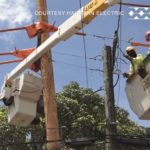
As Hurricane Douglas approaches the islands with the potential for high winds and heavy rains, Hawaiian Electric is proactively preparing to respond, and also says customers should have their emergency plans in place.
The company is closely monitoring Hurricane Douglas’ movement to move crews and equipment to areas most likely to be affected.
Hawaiian Electric suggests customers review family and business emergency plans, ensure they have supplies they need on hand, and pay attention to updates from Hawaii County Civil Defense and the National Weather Service/Central Pacific Hurricane Center. All updates will be posted at kwxx.com
As the storm approaches, Hawaiian Electric provides the following advice:
- Unplug electric appliances you may not need or use until the storm has passed or until power is restored•Check emergency equipment such as flashlights, emergency generators, battery-operated (hand-crank or solar) radios, light sticks, and lanterns to be sure they are operational and buy extra batteries
- Stock up on non-perishable foods, medications, personal hygiene, sanitary and baby supplies to last 14 days
- Keep a first aid kit and special medications
- Pack COVID-19 safety supplies like face cloth coverings, disinfecting supplies, and hand sanitizers in case you need to evacuate
- Pack a manual can opener and bottle opener
- Turn your refrigerator/freezer to the coldest setting; in the event of a power outage, food will keep fresh longer
- Stock an ice chest with ice or frozen ice packs•
Store matches or a lighter in a waterproof container
- Keep a whistle to signal for help•
If you own a pet, have extra pet food and water-
Especially since the onset of COVID-19, residents are urged to shelter in place. Space in emergency shelters will be limited by social distancing requirements and availability of emergency supplies.
Actions to take to prepare the outside of the home include:
- Tie down or store loose objects
- Bring potted plants inside
- Remove and store lanai furniture
- Push deck furniture into the pool
- Cover all windows and door openings with boards, shutters, or other shielding materials
- Wedge a dowel or a piece of broom handle into the track of sliding glass doors to secure them
- If you have a rooftop photovoltaic system, consult with your licensed solar contractor regarding normal and emergency operation procedures for your solar system. As a safety precaution, most photovoltaic systems are designed to safely shut down during outages. PV systems typically have monitoring systems that allow owners to check on the status of their system.
Home health care patients should discuss emergency plans with their physicians or agency representative beforehand and make appropriate arrangements. If necessary, make prior arrangements with a hospital or emergency facility to stay there if you must evacuate.
Storm shelters generally only provide first aid, not nursing care or medical assistance. If you must go to a hospital or emergency facility, be sure to take your medicines, medical equipment and COVID-19 supplies. If the situation is life threatening, call 911.
More electrical safety and preparation tips are available in the company’sHandbook for Emergency Preparedness, available in five languages, at www.hawaiianelectric.com/prepare.